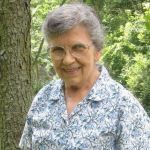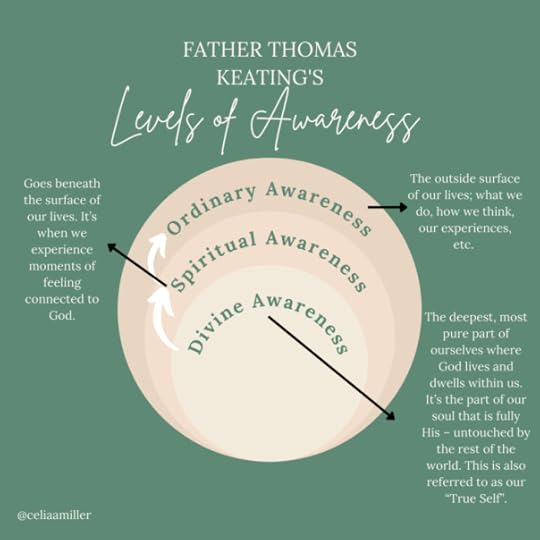Moving into the third level of awareness in everyday life
I went to a large memorial service recently. It was full of stories and very moving because the woman being remembered was influential and beloved. I went because she prayed for me.
 When we first landed in Philadelphia to plant a church, I knew we were likely to fail if we did not call on gifted people to pray for us. I collected scores of people to intercede who got a regular letter listing our triumphs and trials. Grace Holland was among the first to join in. Whenever I saw her she told me how she was praying and often had a question about something in our letter that intrigued her. She might not have known how much that meant to me; and she might not have really cared, since praying was a reward in itself for her.
When we first landed in Philadelphia to plant a church, I knew we were likely to fail if we did not call on gifted people to pray for us. I collected scores of people to intercede who got a regular letter listing our triumphs and trials. Grace Holland was among the first to join in. Whenever I saw her she told me how she was praying and often had a question about something in our letter that intrigued her. She might not have known how much that meant to me; and she might not have really cared, since praying was a reward in itself for her.
Grace’s family is so full of faith and the wildness missionary kids often carry it would have been hard not to have an interesting and spiritually-stimulating morning at the memorial they held. I had a wonderful time. In fact, I have kept mentalizing about it, which led me to write this post.
As a person who has led many meetings for stories, teaching, ceremony and worship, I know members of an audience are not having a singular experience. At any given moment, someone is receiving what is offered with their ordinary awareness, perhaps exclusively. Others will be experiencing it with their spiritual awareness. Still others are blessed in their deepest hearts with an awareness of the presence of God.

Thomas Keating, the main instigator in the Centering Prayer movement which got rolling in the 1970s, drew a simple target graphic to explain his common-sense description of what is happening when we turn toward God. I have been re-reading Cynthia Bourgeault’s classic expansion on his chart in Centering Prayer and Inner Awakening.
Ordinary awarenessSome people who attended the funeral probably experienced it entirely with their ordinary awareness. They might have been children. They could have been a distant relation or acquaintance unfamiliar with the family or their brand of Christianity and were caught up with the curiosity of it all. Or they may have been spiritually undeveloped due to lack of opportunity or resistance. People with childhood trauma or children of parents who did not nurture a secure attachment often find it difficult to connect with other people or God and spend much of their time feeling so responsible for their well-being they can’t do anything else.
Ordinary awareness is the reflexive consciousness that only humans have, as far as we know. I have several pictures of a son staring at his fist as a baby coming to the realization he is a separate being from his mother. We all have the capacity to stand outside ourselves and look upon ourselves in the third person. We come to know ourselves as distinct from others with attributes and gifts that need to be expressed to “be ourselves.”
So I experienced the funeral with my ordinary awareness. For instance, I thought I had left with plenty of time to spare after the long drive from Philly to Harrisburg. But I actually just made it to the memorial in time, since the turnpike was jammed due to a car having caught fire. We saw it melted on the shoulder with its poor owners watching the firemen mop up. The feelings stuck with me. Then I entered a large meeting room with quite a few people I had not seen for years and a few I did not want to see. My “monkey mind” was hopping.
At any given moment our awareness is full of stimulating things coming at us which often stimulate things we have stored up: random thoughts, memories, associations and sensations. We get “triggered,” we like to say, and habitual reactions may lead to a chain reaction that can set off our anxiety. If we did not have that sense of “self” that can step back and see what is going on, we might not be able to endure the chaos. That self-reflexive “I” is probing and measuring the universe all day, and even when we dream it asks things like, “How am I doing?” “Is it safe here?” “What did she mean by that?” “Am I OK?”
Bourgeault says, “Another name for ‘ordinary awareness’ is ‘egoic thinking.’ It is the normal functioning zone of the human mind. It doesn’t matter whether you’re a Ph.D., a bishop, a nuclear physicist; how brilliantly intellectual or intensely devout you may be. Without spiritual training, your sense of the world and your sense of yourself will be formed at this level of awareness. Even the so-called self-awareness tools of our times, from psychotherapy to Meyers-Briggs personality typing to the enneagram, spend most of their effort merely resorting and clarifying the characteristics: ‘I am an INFP,’ ‘a gut-centered type,’ ‘a five,’ etc. This may add insights into the workings of the personality, but it’s till ordinary awareness.
Spiritual awarenessThe funeral lasted about two hours. So there was a lot of opportunity for ordinary awareness. Plus I had to catch up with some old friends which occupied my mind and heart with pleasantries and tragedies.
Thinking together about our experience afterward, my wife and I realized that shortly after we arrived we had already soaked up the emotion swirling around the room, as a psychologist and psychotherapist might be prone to do. We were primed to be moved beyond our ordinary awareness and into our spiritual awareness. Grace was a well-known worshiper, so a time for that was included. Almost with the first note, both of us began to cry. And we were drawn beyond ourselves.
As the worship continued, it would have been hard to miss the experience of spiritual awareness all humans are equipped to have whether someone was a Jesus follower of not. The meeting was like a first glimpse of Yosemite Valley, which seems to make everyone pause with awe. I first experienced such wonder under the stars in the Anza-Borrego desert. You may have felt it during a beautiful fall sunset last week. At times I have been drawn in when my friends were dancing or we were meeting an emergency together. And, of course, babies have been born.
Bourgeault says “spiritual awareness is actually a way of perceiving, just as ordinary awareness is a way of perceiving. As with ordinary awareness, there is a sense of identity or selfhood generated through this mode of perception. The big difference between them is that whereas ordinary awareness perceives through self-reflective consciousness, which splits the world into subject and object; spiritual awareness perceives through an intuitive grasp of the whole and an innate sense of belonging. It’s something like sounding the note G on the piano and instantly hearing the D and the B that surround it and make it a chord. And since spiritual awareness is perception based on harmony, the sense of selfhood arising out of it is not plagued by that sense of isolation and anxiety that dominates life at the ordinary level of awareness.“
Holy Spirit awareness.I was delighted with the smorgasbord of spiritual food we shared with Grace Holland’s family. I think she would have loved it – even the parts she thought we not fully baked yet. She would have loved how the meeting regularly veered into a thin place where we could reach into the bull’s-eye of the target, the goal Father Keating called our “divine awareness.”
The moment in the meeting I remember most, and these moments are usually relatively fleeting for all of us, was when we sang one of Grace’s favorite songs. Her son, Mike, recounted it was a tune that might pop into her ordinary awareness and lead her beyond it at any moment. I have also been moved by it since Maranatha Music released it on Praise 4 in 1980: “I Love you Lord.”
The song arose in the late 1970’s when it tumbled out during Laurie Klein’s quiet time before her toddler woke up. It found its way to Jack Hayford’s Church on the Way in Van Nuys, California, which I visited. It was recorded by several musicians in the budding Christian music scene, including 2nd Chapter of Acts, who I followed. It gained general recognition when Maranatha! Music published it and now Korean choirs sing it, too.
As we sang it, I felt the presence of God course through my body. I was one with God, with those gathered and with everyone who has sang that song throughout my life and throughout the world. I enjoy remembering that experience.
We all have a place at the center of us where our own being and God’s being are mysteriously interwoven, even if we are not aware of it. Bourgeault says, “The divine indwelling is the cornerstone of contemplative prayer. Thomas Keating refers to it as ‘our personal big bang,’ for it reveals the Source of our own being – the explosion of divine love into form which first gave rise to our personal life. It also reveals the direction our heart must travel for a constantly renewed intimacy with this Source. As we enter contemplative prayer, we draw near the wellspring from which our being flows.“
The whole world is full of gloryThe big, noisy funeral I attended did not have much silence at all. Maybe I will leave that as a request for own funeral. But I carried a silent place with me as I attended which has been formed by years of attention to God-with-us. We meet God deep within us and all around us. It is beautiful when a song flows out of your personal, private quiet time. But the whole earth is full of the glory of God. We meet God-with-us wherever we go. We can’t make an appointment, per se, but we can expect that glory to erupt into our awareness.
Bourgeault points out that ordinary awareness and spiritual awareness are both necessary for functioning in this world. “But the idea in spiritual transformation is to integrate and reprioritize these levels so that our ordinary awareness is in alignment with and in service to our spiritual awareness (which in turn, as we have seen, is in service to the divine awareness). In that alignment our being flows rightly, from innermost out. When something needs to be done in the outer world, we have sufficient ego strength to do it. But unlike ordinary awareness, which is always doing things to assert itself or fulfill itself, action grounded in our spiritual awareness merely flows out of the divine abundance without regard to outcome or any need to draw attention to itself.”
To hear her family and pastors talk about her, the heart of God and Grace’s own heart were in a deep embrace at the center of her and much of her action flowed from that abundant life. I took that away as a lesson. But more so, I experienced its legacy at her funeral and joined with her in the eternal life of it.
The post Moving into the third level of awareness in everyday life appeared first on Development.


